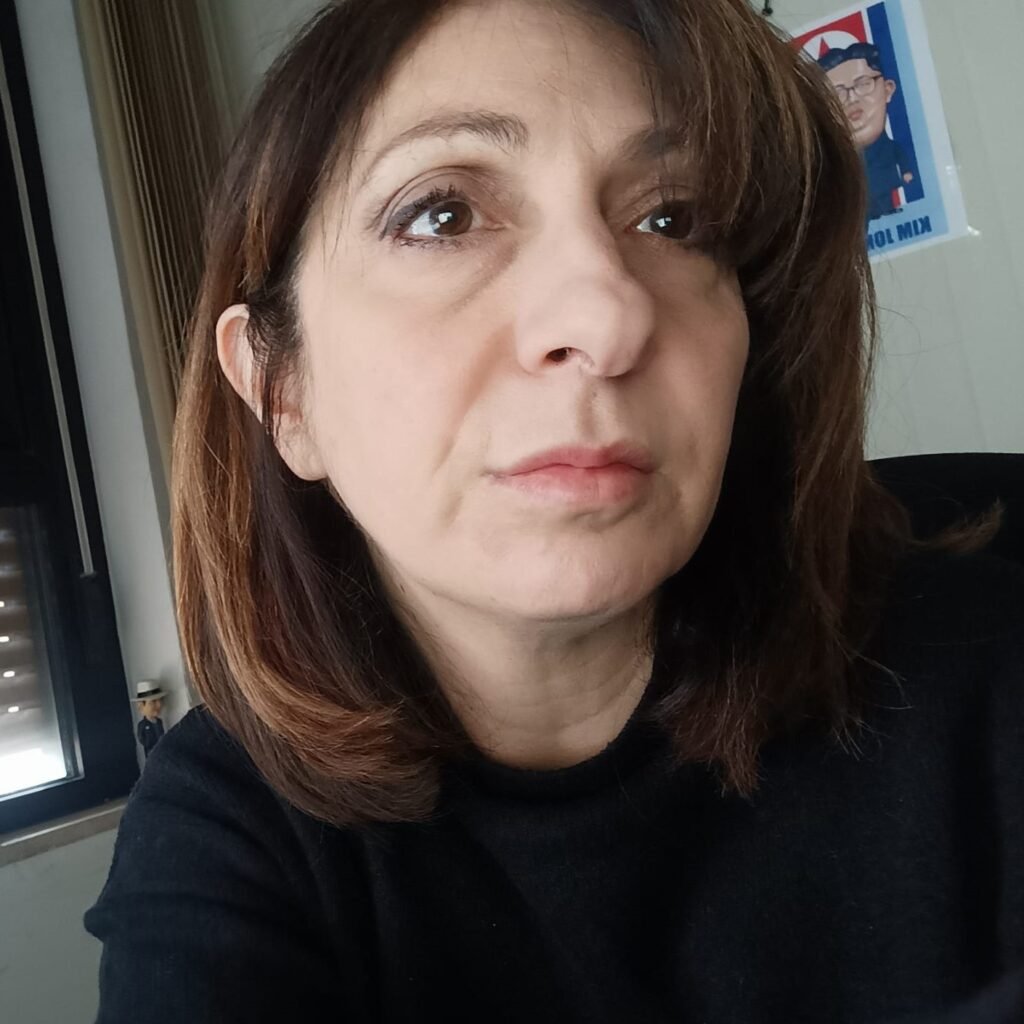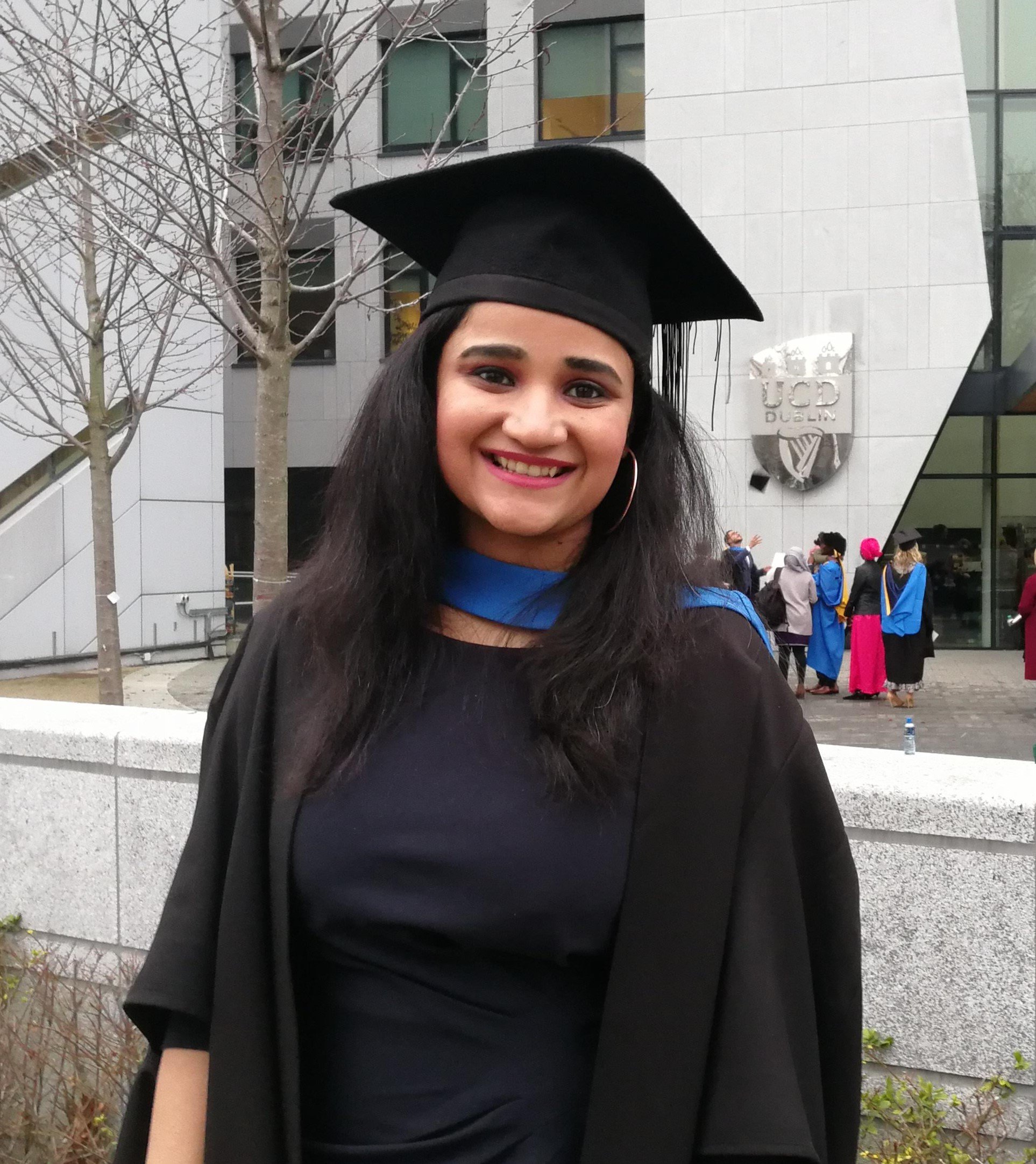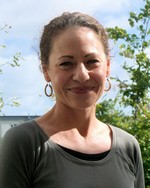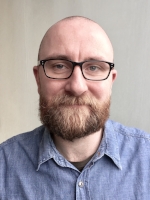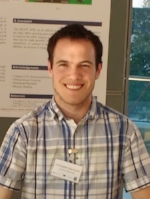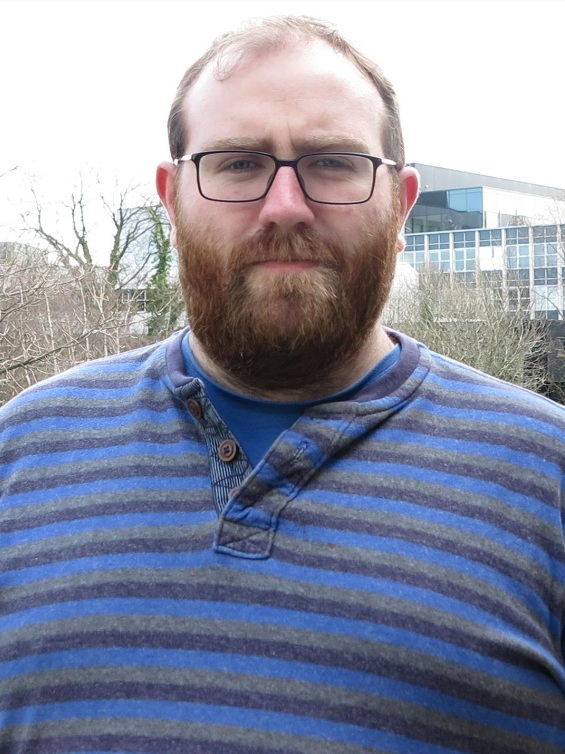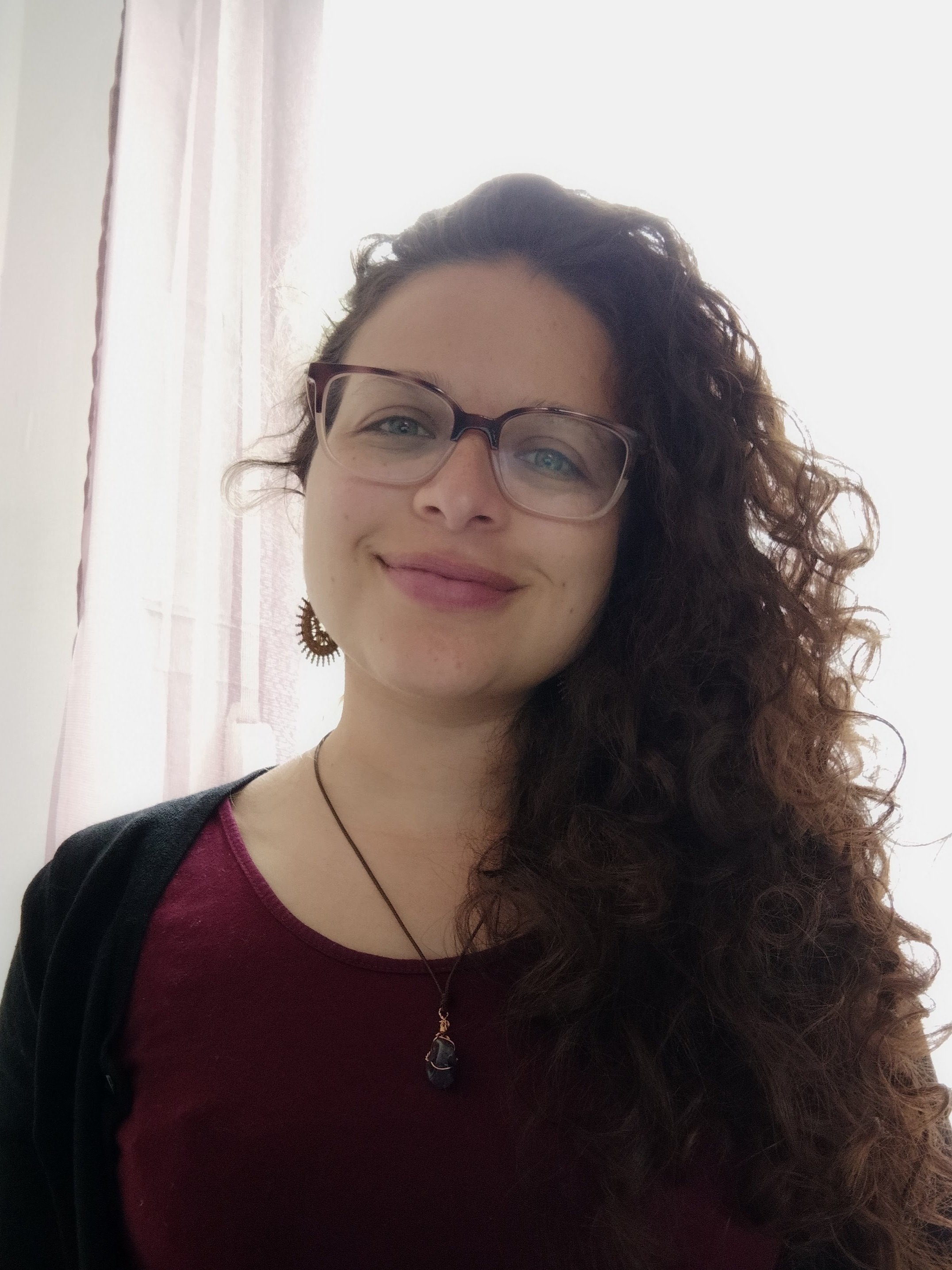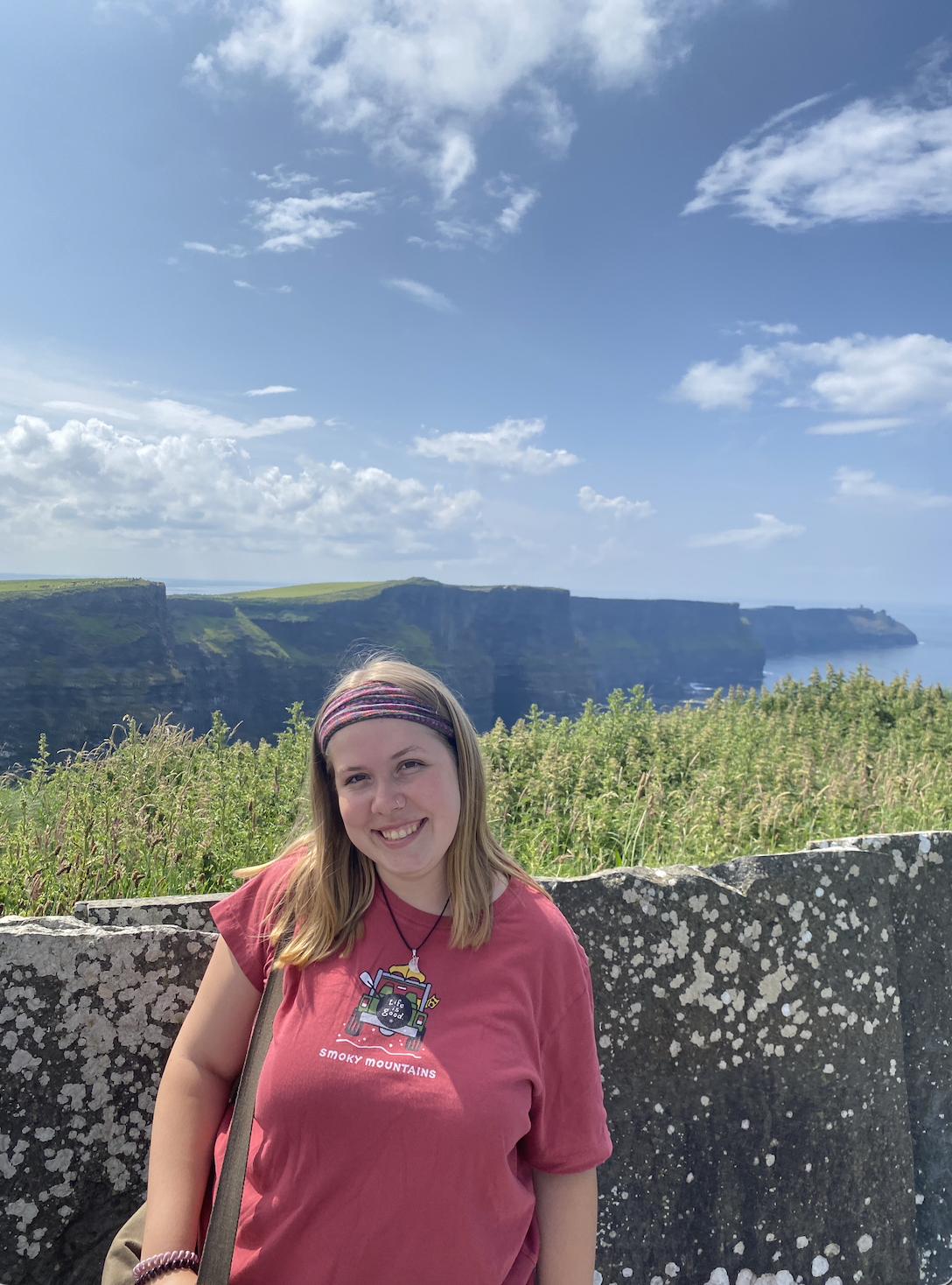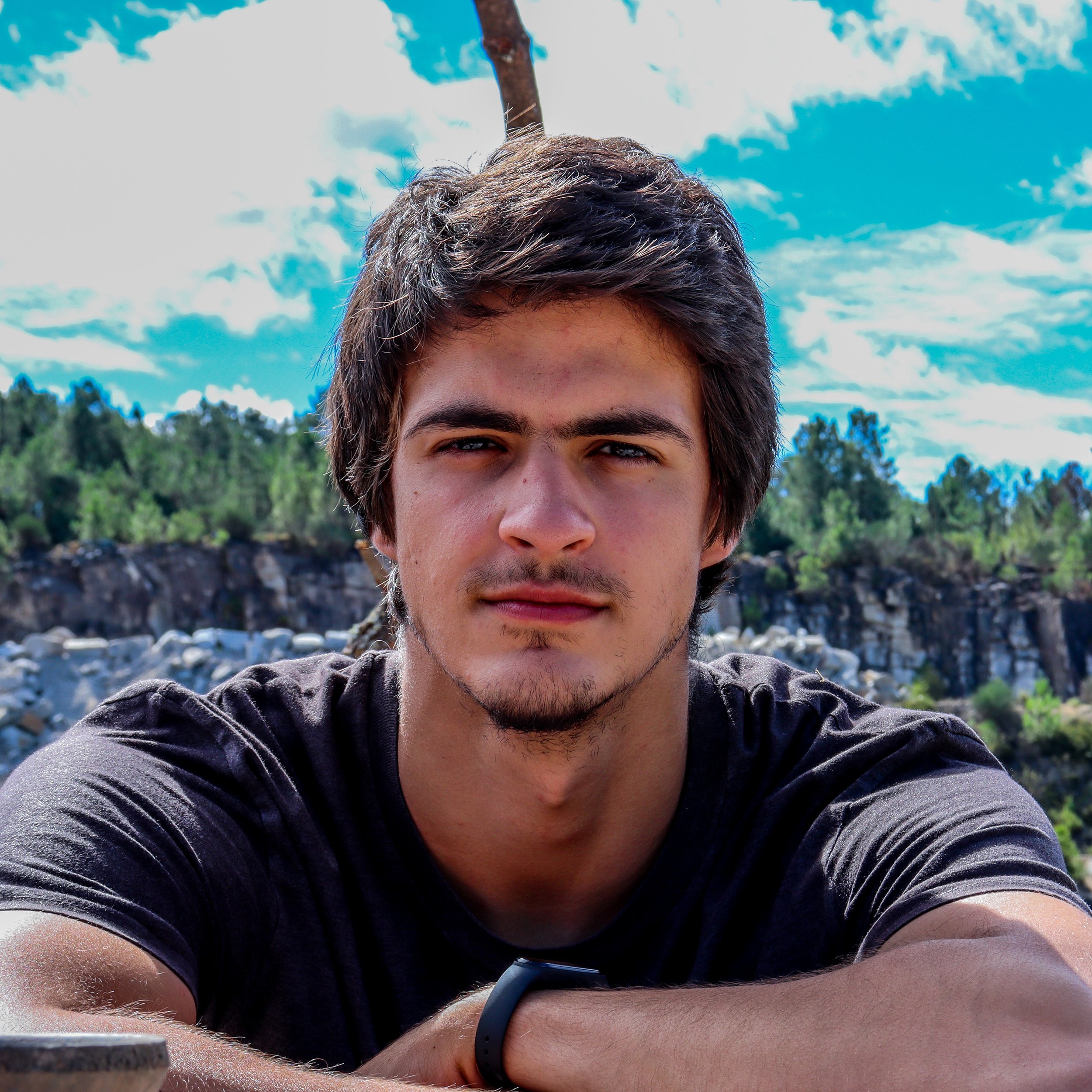Prof. Cinzia Di Franco
Cinzia Di Franco (PhD, Molecular and Chemical Sciences) is a Senior Researcher at the Italian National Research Council – Institute for Photonics and Nanotechnologies (CNR-IFN), and Head of IFN Bari Unit. She also serves as an Adjunct Professor in Physics of Matter at the University of Bari. With expertise in analytical chemistry, biosensors, surface microscopies, and nanomaterials for life sciences, her research focuses on developing micro- and nano-devices and advancing material analysis techniques for photonics and sensing applications. In 2024, she was a Visiting Professor at the UCD Conway Institute in the Nanoscale Function Group, where she worked on a project exploring the feasibility of using quantitative open-loop Kelvin Probe Force Microscopy in liquid environments to study patterned physisorbed biolayers. The research aimed to analyze biolayer configuration, structural properties, nanoscale aggregation processes, and electrochemical phenomena at biolayer-electrolyte interfaces.
Caitlin Guzzo
Caitlin received her BSc and MSc in Nano and Functional Materials Engineering from the University of Alberta, and is currently a PhD candidate in Materials Science at the Norwegian University of Science and Technology (NTNU) under the supervision of Dr. Julia Glaum. Her current research involves the design and fabrication of ferroelectric orthopaedic implant materials, with a focus on using stoichiometry to control functional properties of piezoceramics. Her research stay within the Nanoscale Function Group focussed on liquid PFM of polycrystalline ceramics under the supervision of Dr. Brian Rodriguez.
Markus Hahn
Markus Hahn visited the UCD in 2024 for a 10-week internship project funded by the Erasmus+ program and a Breakthrough Cancer Research summer student scholarship. He joined the research group of Dr. Stephen Thorpe to apply his practical experience in AFM-research he obtained during his work in Austria. The project he contributed to focused on identifying functional sites of Syndecan-4, which is a key transmembrane protein upregulated in pancreatic cancer, using AFM. Dr. Brian Rodriguez and other staff members of the Nanoscale Function Group contributed to his project by helping him getting started with the on-site AFM and lending their expertise. Currently, Markus is focusing on his master’s thesis project back in Austria in medical research at the JKU Medical Institute in Linz.
Claudia Sosa Espada
Claudia is heading into her fourth undergraduate year at UCD, where she is completing a MSc degree in Theoretical Physics. She is joining the Nanoscale Function group for the summer 2024 through a research studentship.
During her time in the research group, she is eager to gain hands-on experience with AFM and explore its potential in natural and bioinspired piezoelectric materials. She will help monitor and analyse their response using various procedures, such as topographical, electromechanical, and pyroelectric characterization.
Connor McIlvain
Connor is a 3rd year student studying Chemistry at the University of Notre Dame. His summer research project at UCD in the Nanoscale Function Group involves working with their Lego AFM. He is excited to bring his previous experience with microscopy to this project.
Dr. Krutika Singh
Krutika obtained her MSc degree in NanoBio Science at University College Dublin in 2018. Later, she joined the School of Chemistry as a PhD student and is currently working on the preparation and optimization of 3D printable hydrogels to produce magnetically responsive constructs for tissue engineering applications under the supervision of Prof. Dermot Brougham and Prof. Brian Rodriguez.
Dr. Jason Kilpatrick
Jason graduated from The University of Newcastle, Australia, in 2000, with a BSc. in Chemistry (Honours) and received the Royal Australian Chemical Institute prize for his work on wax-based emulsion explosives. He also undertook a PhD at the same institution, the last two years of which were spent conducting research at the University of Leeds, UK. Jason joined the Nanoscale Function Group in 2005. Jason's research interests are the development and extension of AFM technology, having 20 years experience in the field.
Dr. Srikanth Kolagatla
Srikanth obtained his Integrated Masters degree from Acharya Nagarjuna University, India in 2014, and obtained his PhD from Ariel University, Israel in 2018. His PhD research work was focused on developing scanning spectro-analytical techniques to study complex electrochemical reactions at the nanometer scale. He is experienced in AFM, Raman spectroscopy, XPS, and electrochemical techniques such as rotating ring disk electrode. His research interests include developing analytical techniques to study active sites in energy storage devices. Srikanth was a postdoctoral researcher funded by Science Foundation Ireland.
Dr. Hossam Ibrahim
During his PhD, Hossam developed a migration assay based on the placement of spheroids on aligned collagen substrates. He is a recipient of a PhD Scholarship in Research and Teaching SIRAT (from the School of Physics). Hossam graduated in June of 2023.
Dr. Emrullah Kargin
Emrullah obtained his Bachelor’s Degree in Metallurgy and Materials Engineering at Firat University (Turkey). After that, he had his Master’s Degree in Materials Science at University of Stuttgart (Germany), during which he worked on a solid-state electrolyte for li-ion batteries as his thesis project in Max Planck Institute Stuttgart. Currently, he is a PhD student in the School of Physics and supervised by Dr. Brian Rodriguez. His PhD is based on nanowire Li-ion batteries, focusing on the electrode-electrolyte interface by Atomic Force Microscopy. Emrullah graduated in June of 2023.
Dr. Chiara Rotella
Chiara obtained her Bachelor degree in Physics in 2010 at the University of Messina (Italy). Then she moved to the University of Trieste to complete an MSc in Microphysics and Structure of Matter with a specialization in “Condensed Matter Physics”. She graduated in 2013 with a title thesis: “Atomic Force Microscopy based investigation of enzymatic reactions study on DNA nanostructures at different densities”. She then moved to Dublin and joined the Nanoscale Function Group as a Marie Curie Early Stage Researcher. Her project, supervised by Prof. Suzi Jarvis is focused on the characterisation of the interactions and the local aqueous environment of protein monomers at model lipid membrane interfaces. She decided to start a PhD to try to apply all the basic physics theories studied and to make full use of the experimental techniques in order to understand the biological processes at the molecular level. In particular, she is very interested in this project because the study of the membrane-liquid interface plays an important role especially in the diffusion of the molecules from the outside to the interior of the cell. Understanding these processes can be useful, for example, in the field of medicine regarding the absorption of different medicines and drugs for particular diseases.
Dr. Lorraine McGill
Lorraine graduated from NUI Maynooth in 2007 with a BSc (Hons) in Biological Sciences. From 2007 to 2011 she did a PhD in Maynooth under the guidance of Prof. Ann Burnell in the Nematode Genetics group. Her project investigated cryobiosis and anhydrobiosis in nematodes of the genus Panagrolaimus with the use of molecular, proteomic and phylogenetic methods. In February 2012 she joined the Nanoscale Function Group. In collaboration with the group of Dr James Carolan, NUI Maynooth, she is using molecular genetics and proteomic methods to discover and characterise the proteins involved in the attachment of the parasitic marine flatworm Entobdella soleae to its host.
Dr. Sabine Neumayer
Sabine is a postdoctoral research fellow working on an international collaborative project in materials science within which she is responsible for scanning probe microscopy studies to elucidate the relationship between structure and functional behavior of ferroelectric thin films. She graduated with a PhD in Physics from University College Dublin in 2016 after having obtained BSc and MSc degrees in Technical Physics from Graz University of Technology. Her research focuses on nanoscale studies of functional materials such as ferroelectric semiconductors and piezoelectric structures with applications e.g. in electronic circuits or microelectromechanical systems (MEMS) for sensors, actuators, energy harvesting and components in memory devices. She has expertise in sophisticated functional AFM modes such as magnetic force microscopy, piezoresponse force microscopy (single and multi-frequency) and related spectroscopy modes (first order reversal curves, switching spectroscopy), electrostatic force microscopy, Kelvin probe force microscopy and conductivity measurements with AFM.
Dr. Bartlomiej Lukasz
Bart graduated from Intercollegiate Faculty of Biotechnology, University of Gdansk and Medical University of Gdansk, Poland, in 2006 with a MSc in biotechnology. He continued his education as a Marie Curie Molecular Neuroimmunology PhD Programme scholar on the University College Dublin, Ireland working on different aspects of schizophrenia aetiology and development. A significant part of this project included confocal imaging and advanced image analysis. Bart became a part of The Nanoscale Function Group as research technical scientist in 2011. His role is to support optical imaging work undergoing in the group as well as to acquire and manage collaborations with external users.
Dr. Stefan Weber
Stefan Weber studied physics at the University of Konstanz (Germany) and received his diploma in 2007. In his diploma thesis, he investigated the interaction of gold nanoparticles under pulsed laser irradiation. From 2007 to 2010 he did his PhD in the group of Prof. Hans-Jürgen Butt at the MPI for Polymer Research in Mainz, Germany. He used electrical SPM modes such as conductive scanning force microcopy and Kelvin probe force microscopy for the investigation of organic optoelectronic materials such as polymer solarcells. Within the Korean-German International Research Training Group (IRTG) ‘‘Self-Organized Materials for Optoelectronics’’ he spent six months of his PhD at Seoul National University (SNU) in Korea and received a joint degree from SNU and Mainz University. In August 2011 he joined the Nanoscale Function Group with a Feodor Lynen scholarship from the Alexander von Humboldt foundation.
David Corish
David Corish graduated from Dublin Institute of Technology (DIT) in 2004 with BSc (Hons) Physics and Physics Technology. He is currently studying for a PhD under the joint supervision of Prof. Suzi Jarvis, Prof John Pethica (School of Physics TCD) and Prof Brian O'Connell (School of Dentistry, TCD) where he is investigating the role of nanoscale surface properties in the regulation of cell behaviour. The focus of this project is to establish the optimum implant surface properties in order to elicit rapid osseointegration and bone development. The work involves investigating the response of Osteoblasts (bone forming cells) to chemically and mechanically modified nano-tubular titania surfaces. AFM, confocal microscopy, scanning electron microscopy and various cell assays are currently being employed for surface characterisation and cellular response analysis.
Dr. Padraig Keane
Padraig Keane graduated from UCD in 2007 with a BSc in Genetics and Zoology. He went on to study for an MRes in Medical and Molecular Biosciences at Newcastle University, England, where he investigated potential epigenetic influences in the development of osteoarthritis. He was first round recipient of an IRCSET postgraduate fellowship in 2008 and joined the group in October of that year, under the supervision of Prof. Suzi Jarvis and Dr Anika Mostaert. Padraig is studying mechanisms of adhesion in a diverse range of species. He is particularly interested in how some animals can generate reliable adhesion when required, yet are also able to detach safely and quickly at will. His current research focuses on the amyloid-based temporary adhesive of the parasitic marine flatworm Entobdella soleae, and also the 'dry' adhesive system found in a number of spider families.
Dr. Paul Weafer
Paul Weafer graduated from NUI, Galway in 2008 with a B.E. (Hons) in Biomedical Engineering. He is currently studying for a PhD in cell biomechanics under the supervision of Dr. Patrick McGarry (Dept. of Mechanical and Biomedical Engineering, NUI Galway) and Prof. Suzi Jarvis. Paul is studying the active dynamics of the cytoskeleton during mechanical stimulation using the combination of atomic force microscopy and confocal imaging. He will develop finite element models to correlate with these experimental observations.
Dr. Tim Brosnan
Tim graduated from UCD in 2009 with a B.Eng. (Hons) in Electronic Engineering. He first joined the Nanoscale Function Group as a summer student in 2008, working closely with our industrial partner, Asylum Research (USA). In 2009 he was a first round recipient of an IRCSET postgraduate fellowship and joined the group in September 2009 under the supervision of Prof. Suzi Jarvis. Tim’s PhD project is focused on the development of a novel high speed atomic force microscope, for the analysis of biological samples.
Dr. Baiyun (Tracy) Liu
Baiyun Liu graduated from Beijing University of Chemical Technology in 2011 with a BSc (Hons) in Material Science and Engineering. She is now studying for a PhD in cell biomechanics under the supervision of Prof. Suzi Jarvis, co-supervised by Dr. Brian Rodriguez. The focus of her project is to probe mechanotransduction pathways using combined atomic force microscopy and confocal microscopy.
Dr. Laila Higgins
Laila Higgins graduated from UCD with a BSc Zoology in 2009, and is presently undertaking a PhD under the superivision of Dr. Anika Mostaert, co-supervised by Dr. Tasman Crowe. She is studying the mechanics and structure of natural adhesives from a range of echinoderm species. This project involves the collection of adhesive footprints secreted by starfish, sea urchins and sea cucumbers, and elucidating their nanomechanical properties and structure using AFM, SEM and optical microscopy. The tube feet from these organisms will also be studied with TEM and confocal microscopy in order to investigate the mechanisms of echinoderm adhesion in more detail.
Dr. Liam Collins
Liam Collins graduated from the University of Limerick in 2008 with a BSc (Education) in Biological Science and Physics. In September of 2009 he went on to complete a MSc in Applied Physics at the same institution. He joined the Nanoscale Function Group In April 2010 under the supervision of Dr. Brian Rodriguez, co-supervised by Prof. Suzi Jarvis. His project is focused on investigating electrostatic interactions at biological surfaces using a scanning probe approach. Currently he is working towards the implementation of KPFM (Kelvin Probe Force Microscopy) to study a variety of proteins, polynucleotides, and lipid membranes in physiologically relevant environments.
Dr. Denise Denning
Denise graduated from Dublin City University in 2010 with a BSc. (Hons) in Applied Physics. In September 2010 she joined the Nanoscale Function Group under the supervision of Dr. Brian Rodriguez. She is studying electromechanical coupling in collagen. Her project involves probing the piezoelectric effect in collagen at various structural levels using piezoresponse force microscopy in both ambient and liquid conditions.
Dr. Kate Ryan
Kate graduated from NUIG in 2009 with a B.Eng in Biomedical Engineering. She then went on to complete a MSc. in Polymer Engineering at Queens University Belfast. Kate joined the Nanoscale Function Group in 2012 as a Marie Curie Early Stage Researcher under the Nanomotion Initial Training Network. Her project, supervised by Dr. Brian Rodriguez, focuses on the investigation of the ferroelectric and piezoelectric properties of aromatic peptide nanostructures through piezoresponse force microscopy with a view to producing a novel organic biosensor.
Dr. Anika Mostaert
Anika obtained her PhD in Biological Sciences from the University of New South Wales, Australia in 1994. Having a Marine Science background, her research focused on the ultrastructure and biochemistry of algae under environmental stress. During a STA postdoctoral fellowship at the National Institute for Environmental Studies, Tsukuba Japan, she worked on chemotaxonomy of red tide algae and green picoplankton. Following a lectureship at the University of Tsukuba, Japan she moved to the USA to work in academic administration at the University of Maryland in Baltimore. Dr. Mostaert returned to research in the middle of 2004 as a Senior Research Fellow in the School of Physics, Trinity College Dublin. In July 2007 she was appointed Lecturer in Nanobiology in the School of Biology and Environmental Science, UCD. Her current research interests focus on the mechanical properties of natural bioadhesives at the molecular level in order to explore mechanisms of adhesive strength.
Dr. Urs Ferber
Urs graduated from the University of Ulm, Germany with a Diploma in Physics in 2008. He joined the Nanoscale Function Group in April 2008 and is currently studying for a PhD under supervision of Prof. Suzi Jarvis. His research project involves using a home built low-noise AFM to study the membrane-fluid interface on lipid bilayers under different physiological conditions. Especially, the altered ordering of lipid molecules under different types and concentrations of ions is observed by imaging the bilayer with molecular resolution.
Dr. Cristiano Giordani
Cristiano obtained a Laurea in Physics from the University of Rome la Sapienza, Italy, in 2000 with experimental thesis work on modelling of membranes applying the Langmuir-Blodgett and Patch-Clamp techniques. In the same year, he moved to the University of Nottingham (UK) where he performed research on bacteriochlorophyll a (BChl a) by solid-state NMR spectroscopy. For a couple of years up to 2004 he worked at the Italian National Institute of Health (ISS) in Rome, Italy, where he studied the interaction between an essential oil (Tea Tree Oil) with planar models of lipid rafts and melanoma cancer cells. In April 2004, he began his PhD in Japan at Kyoto University sponsored by the Japanese Government Scholarship (Monbukagakusho-Mext). The PhD work focused on the study of aggregation and location of cholesterol in organic solvents and large unilamellar vesicles mimicking the lipid rafts by solution-state NMR spectroscopy. Cristiano was awarded a PhD in Chemistry from Kyoto University in September 2007. Cristiano joined the Nanoscale Function Group in 2008.
Dr. Mads Bruun Hovgaard
Mads Bruun Hovgaard graduated his PhD from the Interdisciplinary NanoScience Center (iNANO), Aarhus University in 2007 based on his work within the field of protein adsorption and aggregation on biocompatible, nano modified metal-oxides. He subsequently continued on at iNANO doing a one year postdoctoral fellowship, focused on a risk assessment of free metal-oxide nanoparticles in a range of biological systems, detailing a characterization and identification of nanoparticles suitable for nanotox test across various biological matrixes. He Joined The Nano Function Group in 2008.
Dr. Gillian Kaggwa
Gillian obtained her PhD in Materials Science from the Ian Wark Research Institute, South Australia, Australia in 2005. Over the course of her PhD, her research was heavily focused on interfacial science, specifically the influence of adsorbing polymers on the wettability of model and real mineral surfaces. In 2005 she joined the Nanoscale Function Group through the IRSCET fellowship scheme, investigating localised forces on chemically modified substrates. Gillian is currently involved in an FANAS collaborative project that is concerned with brush-forming molecules as water-based lubricants. Specifically she is investigating the properties of water in and around these systems as a function of solution conditions.
Dr. Geraldine Kelly
Geraldine Kelly graduated from Trinity College Dublin 2004 with a BA (Hons) Natural Sciences, Moderatorship Zoology. She recently submitted her PhD thesis entitled 'The Study of Bone Cell Mechanobiology and its Regulation by the Cell Cycle', which she completed under the joint supervision of Prof. Suzi Jarvis and Prof. Patrick Prendergast (TCD). This research investigated the cell cycle modulation of bone cell mechanobiology and utilised the combined AFM and confocal microscope system in order to investigate the mechanical properties of synchronised osteoblast cells. Futhermore, her PhD research also examined the real-time intracellular responses of mechanically stimulated cells.
Dr. Siu Hong Loh
Siu Hong graduated from Sheffield Hallam University, UK, in 2002, with BEng (Hons) Electronic Systems Engineering. He obtained master’s degree (MSc in Electronics) in Queen’s University of Belfast, Nothern Ireland, in 2003. He then joined the Nanotechnology Group in Multimedia University, Malaysia, involved in the research activity to design nanolithography system using AFM. Siu Hong joined Nanoscale Function Group in April 2008 and began his PhD study under the supervision of Professor Suzi Jarvis. His research currently involves studying interaction of ions with mineral-aqueous interfaces at atomic-scale, using the ultra low-noise FM-AFM developed within the group.
Venkata Pakala
Venkata Sudheer Babu Pakala graduated with an MSc in Biotechnology from Andhra University, India. He subsequently obtained an MS in Molecular Biology, in the area of proteomics and amyloid protein research, from the Umea Centre for Molecular Pathogenesis, Umea University, Sweden. Venkata joined the group in April 2008. His project involved investigating the molecular level structure, formation and composition of physiological amyloid & bacterial adhesives under the supervision of Prof. Suzi Jarvis and Dr. Anika Mostaert. His work involved comparing in-vitro formed amyloid with ex-vivo amyloid to investigate the differences in various aspects including substrates adhesion, morphology and molecular level structure at nanoscale.
Dr. Khizar Sheikh
Khizar graduated from Bath University, UK, in 1987 and worked in the semiconductor industry for 10 years. He completed a degree in Biochemistry in 2000 at Sheffield University, UK, and subsequently a PhD studyingf-assembled monolayers and lipid bilayers using primarily AFM at Leeds University, UK, in 2005. His subsequent postdoctoral fellowships focused on the study of patterned solid supported lipid bilayers, interactions between supported bilayers and actin networks, and the structure and mechanical properties of ceramide-based bilayers.
Dr. Liz Tully
Liz graduated with a BSc (Hons) in Biomedical Engineering and a Diploma in Industrial Studies (with Bayer Diagnostics) from the University of Ulster in 2001. She was subsequently awarded a graduate research fellowship from the University of Illinois, Chicago (UIC) and spent a year working on the development of nanofabricated cellular-microencapsulation constructs, for the treatment of diabetes. She then returned to Ireland and began a Ph.D in Applied Biochemistry at Dublin City University, under the supervision of Prof. Richard O’Kennedy. Her postgraduate research focused on novel antibody-based biosensors for the detection proteins, haptens & whole cells and she completed her PhD in 2007. As a postdoctoral researcher, also at DCU, her research involved the development of biocatalytic enzyme nanocomposites for industrial applications. She joined the Nanoscale Function Group in August 2008 as group co-ordinator, where she is responsible for supporting and facilitating research outputs, teaching co-ordination, research commercialization, conference organization, project & funding management, outreach activities and postgraduate student support & mentoring.
Dr. Anita Wdowicz
Anita is a postdoctoral research fellow working under the supervision of Assoc. Prof. Brian Rodriguez in the UCD Conway Institute. She graduated with an honours BSc in Genetics and a PhD in Neuroscience, which she completed in the UCD School of Biomolecular and Biomedical Sciences (SBBS) under the supervision of Assoc. Prof Keith Murphy. Her doctoral work focused on the role of immune system modulators in cognition. Currently, Anita is supported by a New Interdisciplinary Initiatives Fund (NIIF) to investigate the effects of nano-topographical cues of a ferroelectric material on axonal growth. The project involves using bi- and tri-compartmental microfluidic chips that isolate axons, bonded to biocompatible lithium niobate templates, which can be tailored to study axonal response in a physiological and injury-like environment. This challenging work aims to unite related activities in Physics, SBBS, Medicine, Chemistry and Materials Engineering in a synergistic way to gain insight into nerve regeneration and addresses challenges in nerve repair.
Dr. Maarten van Es
Maarten completed his MSc in Physics with Tjerk Oosterkamp at Leiden University, The Netherlands in 2003 with a thesis on Recognition Imaging with AFM. For this work Maarten studied half a year in Linz, Austria with Peter Hinterdorfer. In 2008 Maarten finished a PhD at Leiden University on smart probing of biological and biomedical systems with AFM. Maarten joined the Nanoscale Function Group in 2008 as Technical Scientist. Maarten is currently a postdoctoral researcher with the Interface Physics Group at Leiden University
Dominik Schreyer
Dominik Schreyer is a master student from Germany visiting the Nanofunction Research Group for four months as part of an internship via the Erasmus student exchange program. He graduated with a B.Sc. in Nanoscience at the University of Hamburg in 2015. Continuing his studies, he's aiming for an M.Sc. as well. During his stay at the UCD, he worked on mapping the contact potential difference of DNA in liquid using the DH-KPFM approach.
Abi Thampi
Abi joined UCD in 2016 for his Masters in Physics after graduating with a Bsc (Honours) Physics degree from St. Stephen’s College, Delhi, India. He has been awarded with the V.V. Giri Global Excellence Scholarship (2016-17) by UCD for his academic excellence. During his Bachelor’s degree, he had worked on “Magnetic nanoparticles for the application in hyperthermia” at National Institute of Technology, Tiruchirappalli, India. Currently, he working in the Nanoscale Function Group for his masters project on “Energy harvesting using peptide nanotubes” under the supervision of Dr. Brian Rodriguez. Abi started a PhD in New Zealand upon completion of his masters.
Kevin Keogh
Kevin graduated from UCD in 2016 with a BSc (Honours) degree in Physics with Astronomy and Space Science. He is currently studying for a Masters in Nanotechnology and working in the Nanoscale Function Group for his Masters Project on the topic of “Energy Harvesting using peptide nanotubes” under the supervision of Dr. Brian Rodriguez. Upon starting the Masters in UCD, Kevin was awarded a scholarship as part of the inaugural Intel-UCD Masters programme.
Dr. Salvador Moreno
Salvador Moreno, a Texas native, hails from the University of Texas at Dallas (BS, 2014) (MS, 2015) in the US. He is currently a PhD student and a member of the Nanobio Lab at UT Dallas under the supervision of Dr. Majid Minary. He received a National Science Foundation Graduate Research Fellowship to conduct a study on the biomedical application of flexible electronics with collagen as a substrate. Project areas include semiconductor manufacturing, device design, electronic characterization, collagen spectroscopy/microscopy and cell viability. Under the NSF GROW collaboration with SFI, Salvador is visiting the Nanoscale Function Group under the supervision of Dr. Brian Rodriguez to study the collagen piezoelectric properties of fish scales.
Alexis Symcheck
Alexis Symcheck was a visiting student studying biomedical engineering at the University of Texas at Dallas. She worked on a project related to 3D scanning and printing during an internship in the lab.
Gerard Larkin
Gerard worked as a research engineer involved in the development of a prototype liquid phase 3D Bioprinter. Gerard investigated cell health and affinity with various biopolymers utilized by the Bioprinter. He worked for 7 years in the clinical trials industry for ICON plc before making the move into physics education and research. He obtained his Bachelors degree (B.Sc. Hons) in Physics Technology from the Dublin Institute of Technology in 2015. While there he engaged in research projects with groups at the FOCAS Institute (improving photovoltaic efficiency through the addition of a luminescent down-shifting layer and statistical analysis of structural changes in ATM affected t-lymphocyte cells) and at the Helmholtz-Zentrum Dresden Rossendorf research facility where he researched material characteristics of the III-V diluted magnetic semiconductor GaMnP. In 2016 Gerard went on to complete a M.Sc. in Physics at University College Dublin where his thesis focused on reducing thermal drift in nanoscale images.
Christophe Marchand
Christophe undertook an internship with the nanofunction group as part of his training as an electrical engineer at Polytechnique Montreal in Canada. His project consisted of making an AFM with Lego bricks in order to reach more people with AFM. In the end, the Lego AFM helped people that were new to the concept understand its basic principles and replicate a similar AFM.
Ciana Ramsey-MacSweeney
Ciana graduated with BSc(Hons) in Bioanalytical Science in 2017 from the Letterkenny Institute of Technology, for which she received a Women in Technology Award. She is currently completing a Masters of Physics in Nano Bio science in UCD, where she is working with the Nanoscale function group under supervisor Dr. Brian Rodriguez on the topic of 'Energy Harvesting using Peptide Nanotubes'.
Elizabeth Storey
Elizabeth obtained a B(Ed)Sc degree in Physics and Chemistry with Concurrent Teacher Education from the University of Limerick. She is currently completing a MSc in Nanotechnology with the School of Physics. She is carrying out her thesis project under the supervision of Dr. Brian Rodriguez and with the Nanoscale Function Group in the Conway Institute of Biomolecular & Biomedical Research. Her research focuses on using ferroelectric lithium niobate to drive the self-assembly of micro- and nanomaterials.
Kevin McCarthy
Kevin is a research engineer working on the development of a commercial prototype for a liquid phase 3D bioprinter. He obtained his Bachelor’s degree (BSc Ing (Hons)) in mechanical engineering in 2013 from Trinity College Dublin, and his Master’s in Engineering, from Trinity College Dublin in 2014. Kevin then went onto work as a Product Development Engineer in Innopharma Technology for almost two years where he worked on electronic, electrical and mechanical design projects.
Dr. Rosa Alshammari
Rusul (Rosa) is a PhD student in the School of Physics and Conway Institute of Biomolecular & Biomedical research under the supervision of Dr. Brian Rodriguez and Dr. James Rice. She is working with a research focus on exploring the use of charge-patterned surfaces in biomedical applications of nanospectroscopy methods. She obtained a BSc in Physical Chemistry (Baghdad University) for which she won master's funding to design and construct automated Z-Scan system to study nonlinear optical properties of nanoparticles. Then she worked as a biochemistry lecturer assistant at the Optics Techniques Department (Dijla University College in Iraq). Since then she joined the UCD School of Physics in 2012 as a visiting researcher and in 2014 she received a PhD Scholarship in Research and Teaching (from the School of Physics).
Sumesh Erikandath
Sumesh received his MSc degree in NanoBioscience from UCD in 2018. He has been working in the field of material science and nanotechnology for the past several years. He has served as a quality control chemist/mineralogist in ACC Cement (Lafarge-Holcim Group) before joining UCD. Before that, he was working at the Indian Institute of Technology, Madras in a project on water purification using nanomaterials and had also developed a novel silver nanomaterials-based column for mercury contamination. He has a previous masters degree in chemistry from the University Of Madras, India. He worked on microcontact printing of biomolecules for electrostatic-based detection.
Dr. David Edwards
David obtained an MSci in Physics at Queen’s University Belfast in 2014, and is expected to acquire his PhD from the same institution in 2018 pending completion of his viva. Over the course of his PhD his research focussed on ferroelectric materials, investigating the role of nanoscale stress on their microstructure and switching behaviour. He has gained experience with various AFM modes such as piezoresponse force microscopy, conductive-AFM and force spectroscopy. He joined the Nanoscale Function Group in March 2018 as a postdoctoral researcher, continuing work on an international collaborative project to elucidate the processing-structure-property relationships in ferroelectric thin films.
Dr. Maha Alruwaili
Maha Alruwaili received an MSc and a PhD from UCD. Her doctoral research was on liquid phase 3D bioprinting. She was supervised by Dr. Brian Rodriguez and Dr. Emmanuel Reynaud (SBBS). She graduated with her PhD in 2020.
Bahar Tavakkoli
Bahar was a visiting student at the UCD Conway Institute (and a lifetime member of the group). She received her master’s degree in microelectrode biosensors from the faculty of electronic and biomedical engineering at University Putra Malaysia and her bachelor’s degree in simulation and implementation of electrocardiogram (ECG) from Shand University of Technology, Tabriz, Iran. While at UCD she focused on Atomic Force Microscopy (AFM) and Piezoelectric Force Microscopy (PFM) under the supervision of Professor Brian Rodriguez. Bahar now works at TCD.
Dr. Sawsan Almohammed
Sawsan Almohammed obtained her MSc degree in Nano-bio Science at University College Dublin in 2014. She joined the Nanoscale Function Group in January 2015 as a PhD student under the supervision of Dr. Brian Rodriguez and Dr. James Rice (Nano Photonics Group, School of Physics). Her project focuses on investigation of the physical and optical properties of aligned peptide nanotubes and Fmoc-FF hydrogels coated with SERS-active metal nanoparticles. Dr. Almohammed subsequently was a postdoctoral research in the Nano Photonics Group.
Dr. Fengyuan Zhang
Fengyuan Zhang is a PhD student in the School of Physics under the supervision of Dr. Brian Rodriguez. She received a Master degree from South China Normal University in 2016 and Bachelor degree from Hefei Normal University in 2013. She is working on the characterization of ferroelectric materials with a focus on ferroelectric domains in thin films and nanostructures.
Dr. Arwa Bazaid
Arwa Bazaid obtained her MSc degree in Nano-bio Science at University College Dublin in 2013. She joined the Nanoscale Function Group in April 2014 as a PhD student under the supervision of Dr. Brian Rodriguez. Her project focuses on investigation of the piezoelectric, mechanical and physical properties of collagen using scanning probe microscopy, which will enable broader understanding of bio functionality in connective tissues (e.g. tendon).
Maria Graham
Maria is a second year undergraduate student studying Theoretical Physics at UCD. She is currently undertaking an internship under the supervision of Brian Rodriguez looking to design and build an improved conceptual atomic force microscope to be used for teaching and outreach purposes.
Dayana Sierra
Dayana G. Sierra is PhD student in the program of Materials Science and Engineering at CICECO- Aveiro Institute of Materials, University of Aveiro in Portugal. She has a background in electronic engineering and obtained her master’s degree in biomedical materials and devices in 2018 at the University of Aveiro. Her current research interest is the development of bionanocomposites to fabricate and characterize functional and environmentally friendly, flexible piezoelectric materials for biomedical applications. Dayana performed some of her PhD research in the Nanoscale Function Group during a Short Term Scientific Mission.
Osahenre Samuel
Osahenre Samuel was a 4th year student working under the co-supervision of Antonio Benedetto and Brian Rodriguez in 2023. She used AFM to characterise amyloid fibril formation in the presence of ionic liquids.
Xabier Larrañaga
Xabier graduated in Industrial Engineering in 2016 (University of Basque Country EHU) and received his MSE in Industrial Engineering specialized in Material Science in 2018 from University of Basque Country. Xabier is working on a PhD research project within the Science and Engineering of Polymeric Biomaterials research group of Prof. Jose Ramon Sarasua. The research project focuses on the study of segmental dynamics of high toughness polylactide (PLLA) based composites and the development of such systems towards 3D printable orthopaedic medical devices. Currently, he studies the mechanical behaviour of the crystalline/amorphous interphase in neat PLLA and PLLA based composites via Atomic Force Microscopy. Xabier was a visiting PhD student in the Nanoscale Function laboratory of Prof. Brian Rodriguez during 2023.
Surabhi Sathish
Surabhi is a sixth-year secondary school student from Kilkenny, who enjoys building things. She loves working with cutting edge technology, and is passionate about all things STEM. She aims to study aerospace engineering in university to one day help explore the unknown for humanity's benefit. Wanting to gain hands-on experience in a university laboratory, she currently collaborates with Sam Lawrence under the guidance of Prof. Brian Rodriguez, enhancing the LEGO AFM and developing a modular AFM for outreach.
Leena Jafri
Leena is going into her third year at Ohio State University as a neuroscience major and is currently at UCD on the STEM Summer Research study abroad program. Her project is focused on testing the effects of an agent that is both anti-inflammatory and antioxidant on Alzheimer's disease, using AFM to observe amyloid fibrils, under the supervision of Dr. Brian Rodriguez and Dr. Derek Costello.
Ella Huff
Ella is heading into her third undergraduate year at Michigan State University where she is studying human biology with a minor in bioethics. She is currently at UCD on the STEM Summer Research study abroad program. She is studying the role of syndecan-4 in cell mediated collagen alignment using AFM under the supervision of Drs. Stephen Thorpe and Brian Rodriguez.
Gustavo Carmo
Gustavo graduated in Mechanical Engineering in 2020 and obtained his MSc degree in 2022 (University of Aveiro, Portugal). With an area of expertise in finite element analysis of biological structures, Gustavo joined UCD in June as a research assistant to characterize multiple biological tissues under large strain rates and large strains, for further use in finite element simulations. Gustavo is working under the supervision of Prof. David MacManus, an expert in biomechanics of traumatic brain injury and characterization of biological tissues, in collaboration with Prof. Rodriguez.
